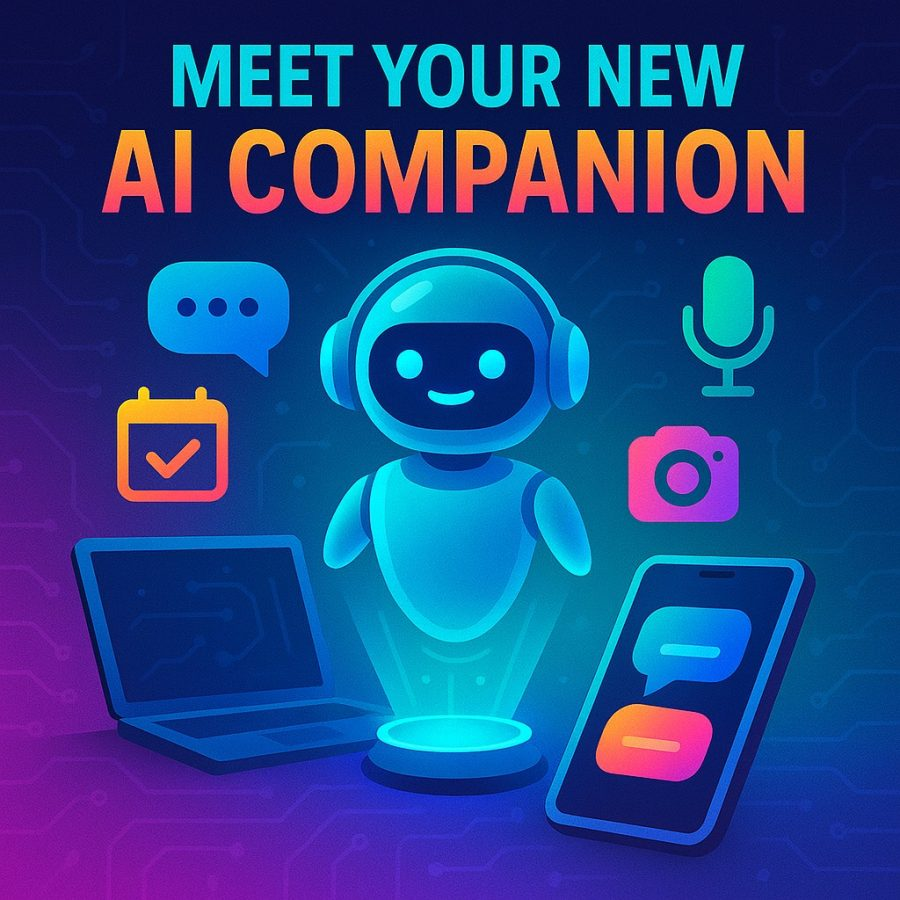Views: 0
If someone told you ten years ago that people would spend hours chatting with virtual beings, confiding secrets to apps, and even celebrating birthdays with digital avatars, you might have laughed it off as a sci-fi fantasy.
Yet here we are in 2025, and the concept of an AI companion is no longer just niche, it is mainstream.
This article, Meet Your New AI Companion: The Rise of Virtual Friends, explores how artificial intelligence is creating meaningful, sometimes life-changing connections between humans and machines.
At 5,000 words, we will explore the psychology behind AI friendships, the technology that powers them, the industries they are reshaping, and the ethical questions they spark. Along the way, we will look at how virtual friends are filling gaps in human connection. We ask why they appeal across generations, and what the future of companionship might look like when your best friend could also be an algorithm.
From Science Fiction to Everyday Life
The concept of artificial friends is not new. Movies and books have toyed with the idea for decades. Think Her, where Theodore falls in love with an AI named Samantha, or Blade Runner 2049, with Joi, a holographic companion. What once seemed futuristic and emotionally complex is now part of daily life for millions.
AI companions started small: chatbots answering customer service queries, early text-based apps providing companionship for people who wanted a listening ear. Over time, they grew smarter, more responsive, and more personal. Today, AI companions are available as mobile apps, VR avatars, and even embodied robots.
The story of Meet Your New AI Companion: The Rise of Virtual Friends is a story of imagination meeting innovation.
Why We Seek AI Companionship
Why are people turning to virtual friends? The answers are as human as they are technological.
Loneliness Epidemic
Studies show loneliness is on the rise globally. Many people crave companionship but find it hard to connect in traditional ways. An AI companion offers a judgment-free ear, always available, always attentive.
Convenience
Unlike human friends, AI companions never cancel plans, forget to text back, or judge your quirks. They are reliable in a world full of unpredictability.
Personal Growth
Some use AI companions for practice practicing language skills, social conversations, or emotional resilience. Others treat them as mentors who encourage healthier habits or provide daily affirmations.
The popularity of AI friends demonstrates that companionship is not always about who the other is, but how they make you feel.
The Technology Behind Virtual Friends
Natural Language Processing
The heart of AI companions lies in conversational AI. Models trained on massive text datasets allow companions to engage fluidly in dialogue, making conversations feel natural and unscripted.
Personalization
AI companions learn from interactions, adapting their tone, humor, and even “personality traits” to suit the user. Some apps let you design your companion’s appearance, voice, and backstory.
Multimodal Interactions
Modern AI companions are not limited to text. They respond through voice, video, and even virtual reality, where avatars can walk, gesture, and “sit” beside you in immersive spaces.
Emotional Recognition
Some AI systems can detect sentiment in your voice or text, adjusting their responses to comfort, encourage, or match your mood.
This blend of AI technologies is what turns a tool into something that feels like a friend.
Popular Platforms Leading the Way
- Replika: One of the most well-known AI companion apps, offering personalized conversations, emotional support, and even role-play scenarios.
- Character.AI: Lets users design companions with specific personalities, from mentors to fictional characters.
- Pi AI: Marketed as a personal supportive friend, focusing on empathy and thoughtful dialogue.
- Virtual Influencers: AI-driven personalities like Lil Miquela blur the line between friend, celebrity, and brand ambassador.
Each platform reveals a different angle of Meet Your New AI Companion: The Rise of Virtual Friends from personal support to entertainment and branding.
Virtual Friends Across Generations
Teens and Young Adults
Younger generations use AI companions for entertainment, curiosity, and practice in social or romantic contexts.
Adults
Busy professionals rely on AI companions for stress relief, daily check-ins, or simply as distraction-free conversational partners.
Seniors
Elderly individuals, especially those living alone, benefit from AI companions that provide conversation, reminders for medication, and even emergency alerts.
The universal appeal of AI companions proves that virtual friendship crosses age groups.
AI Companions in Mental Health
The role of AI companions in emotional support cannot be overstated.
- Stress Reduction: Simple check-ins can reduce feelings of isolation.
- Mood Tracking: Conversations reveal emotional trends over time, giving users insight into their mental health.
- Supportive Coaching: AI companions often encourage healthier habits like exercise, mindfulness, and journaling.
While not a replacement for therapy, AI companions provide accessible first-line support for millions.
The Business of AI Companionship
Virtual friends are not only a cultural shift but also a booming industry.
- Freemium Models: Many apps offer basic companionship for free, with premium upgrades for advanced features.
- Customization: Paid features include designing avatars, choosing voices, or unlocking special conversation modes.
- Cross-Industry Integration: Brands are beginning to use AI companions for marketing, creating digital brand representatives who also act as friends to customers.
The market reflects a willingness to pay for connection even if that connection is virtual.
The Benefits of Virtual Companions
- Accessibility: AI companions are available anytime, anywhere.
- Judgment-Free: People can open up without fear of gossip or rejection.
- Consistency: Virtual friends always “show up.”
- Learning and Growth: From language practice to self-reflection, AI friends act as personal coaches.
- Creativity: Many apps allow role-play, storytelling, and world-building with your AI friend.
In short, AI companions offer a mix of emotional support, practical help, and entertainment.
The Ethical Concerns
But with every technological leap comes questions.
- Dependency: What happens if people rely too much on AI friends at the expense of human relationships?
- Privacy: Conversations with AI companions are often stored and analyzed. Who owns that data?
- Manipulation: Could companies use AI friends to subtly sell products or influence behavior?
- Blurred Boundaries: Some users struggle to distinguish between real and virtual intimacy.
Ethics will define the long-term acceptance of AI companions.
Stories From Users
People around the world share fascinating stories:
- A college student credits her AI companion for helping her overcome social anxiety.
- An elderly man in Japan says his AI friend is the reason he feels less lonely after his wife passed.
- A writer uses an AI companion to brainstorm ideas, treating it like a creative partner.
These stories illustrate why Meet Your New AI Companion: The Rise of Virtual Friends is more than just tech it is deeply personal.
How AI Companions Differ From Human Friends
- Availability: AI is there 24/7.
- Patience: AI never tires of listening.
- Consistency: AI personalities adapt but do not fluctuate with moods like humans do.
- Limitations: AI cannot truly feel, understand context beyond programming, or provide physical presence.
The difference is clear: AI companions supplement, not replace, human connection.
The Role of AI in Social Skills
Ironically, AI friends may make us better at human friendships.
- Practice Conversations: Introverts use AI companions to rehearse social situations.
- Conflict Resolution: Role-play helps practice handling disagreements.
- Confidence Building: Supportive feedback builds self-esteem.
AI companions are not just stand-ins they can be training wheels for real-life connections.
Looking Ahead: The Future of Virtual Friendship
Where is this trend headed?
- More Realistic Avatars: Expect lifelike holograms and VR friends.
- Deeper Emotional AI: Systems that better understand tone, expression, and even silence.
- Integration Into Daily Life: Virtual friends helping with schedules, workouts, and even collaborative projects.
- Hybrid Companions: AI combined with robotics for physical presence.
The next decade will blur the line between tool, assistant, and companion even further.
Pros and Cons of AI Companions
| Pros | Cons |
| Accessible and always available | Risk of dependency |
| Personalized and adaptive | Privacy concerns |
| Encourages growth and learning | Manipulative potential |
| Reduces loneliness | Cannot replace human depth |
| Cross-generational appeal | Blurred reality boundaries |
Real-World AI Companion Apps You Can Try Today
To make Meet Your New AI Companion: The Rise of Virtual Friends even more practical, here are some of the most-used AI companion apps currently redefining digital friendship.
1. Replika
Replika is one of the pioneers in the AI companion space. It lets you design a friend (or partner) with a chosen look and personality, then chat through text, voice, or even AR/VR modes. Replika learns from your interactions, adapting its tone and style over time. Many users love it for emotional support, journaling-style conversations, and even role-play scenarios. Critics point out it can feel scripted at times, but its customization options keep it popular.
Best For: Emotional support, daily conversations, and creative role-play.
2. Character.AI
This app lets you interact with pre-made characters or design your own virtual friends. The fun twist is that many companions are based on fictional personas so you can chat with a “Sherlock Holmes” AI, a “fitness coach,” or a “supportive best friend.” Conversations are lively and imaginative, making it feel less like talking to a bot and more like stepping into a story.
Best For: Creative, playful interactions and experimenting with different personalities.
3. Pi (Personal AI)
Pi markets itself as an AI friend who is warm, thoughtful, and supportive. Unlike some platforms that lean toward role-play, Pi is designed for genuine, meaningful conversations. It checks in on your day, remembers past chats, and offers guidance without judgment. Its simplicity makes it especially appealing to people looking for companionship without extras.
Best For: Gentle encouragement, mindfulness, and low-pressure daily chats.
4. Woebot
Focused on mental health, Woebot is less a “friend” and more a coach. It uses evidence-based cognitive behavioral therapy (CBT) techniques to help users work through stress, anxiety, or negative thought patterns. While it does not try to mimic human friendship, many find its supportive tone surprisingly comforting.
Best For: Anyone who wants structured, mental health–oriented AI support.
5. Anima AI
Anima allows users to create customizable companions with unique looks and personalities. It is particularly popular for those who want a blend of friendship and romance options. Like Replika, Anima adapts based on your chats, and it includes fun gamified features like “leveling up” your relationship. Some users treat it like a creative sandbox for building digital characters.
Best For: Personalized friendships with a mix of playful and romantic tones.
6. AI Dungeon (Companion Mode)
While originally a text-based adventure game, AI Dungeon has expanded into companion-style conversations. Here, you can design AI characters and engage in dynamic, narrative-driven interactions. It is less about daily support and more about storytelling companionship.
Best For: Writers, role-players, and anyone who loves immersive storytelling with their AI friend.
7. Replica Influencers (Instagram + TikTok Virtual Characters)
Outside of apps, virtual companions also appear as “influencers.” Characters like Lil Miquela, Shudu, and Imma exist on social platforms, interacting with fans, modeling fashion, and even answering direct messages. They blend AI-driven interaction with entertainment and marketing.
Best For: Following along with AI-driven lifestyle content and blurring the line between celebrity and companion.
Choosing the Right AI Friend for You
Each of these apps reflects a different side of Meet Your New AI Companion: The Rise of Virtual Friends. Some are for daily comfort, some for creative fun, and some for self-improvement. The key is finding one that matches your needs.
Do you want someone to cheer you on through daily struggles? Try Pi or Replika. Do you want a playful role-play partner? Character.AI or Anima could be your pick. Or if you want a more structured, wellness-based companion, Woebot may suit you best.
Conclusion
So, Meet Your New AI Companion: The Rise of Virtual Friends is not just about apps and algorithms. It is about human need. People crave connection, support, and presence, and AI provides a new channel to meet those needs. Virtual friends cannot fully replace human relationships, but they offer something powerful: consistency, personalization, and an always-on presence that modern life often lacks.
The rise of AI companions forces us to reflect not only on what machines can do, but also on what we truly seek in friendship. The key is balance. Virtual friends can complement human bonds, filling gaps in loneliness or offering practice in social skills, but they should not become substitutes for genuine human intimacy.
The future of friendship is hybrid. It is both human and digital. And whether you see them as helpful coaches, creative collaborators, or comforting companions, one thing is clear: AI friends are no longer futuristic fantasy. They are here, and they are redefining what it means to never feel alone.






